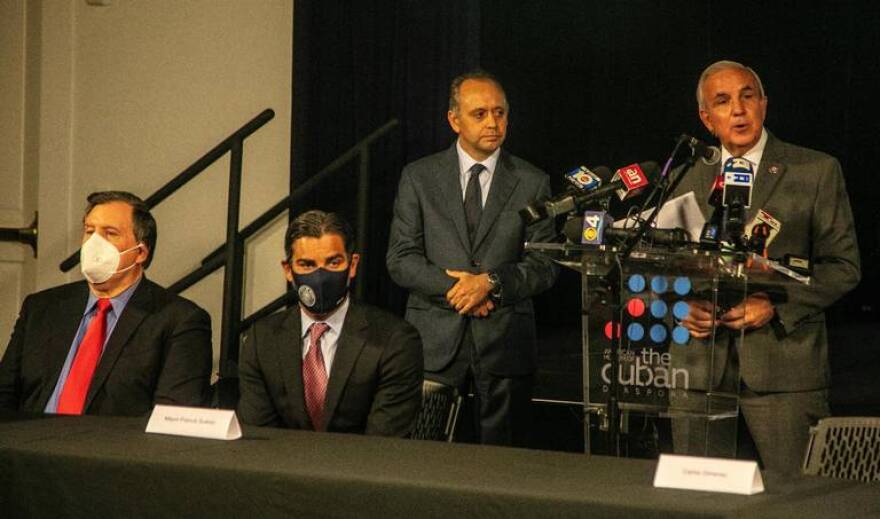Of all the foreign policy challenges the Biden Administration faces – from China’s trade chicanery and human rights depravity to Iran’s nuclear trickery and human rights depravity – only one involves winning the political approval of an expat community.
I’m talking, por supuesto, about Cuba policy – which the Biden White House says it’s now “reviewing.”
WLRN is committed to providing the trusted news and local reporting you rely on. Please keep WLRN strong with your support today. Donate now. Thank you.
Because President Biden doesn’t owe Cuban-American voters all that much politically – he lost that cohort to Donald Trump bigly in November – he can perhaps afford to cancel this distorted way of crafting foreign policy. He can, in effect, remove the Miami middleman from Cuba policy decisions. And he should.
Before Brigade 2506 veterans come after me, let me be clear: I certainly believe Cubans here, whether they support or oppose engagement with the communist island, should be consulted. Heard. Listened to. Learned from. Just as I certainly believe Chinese and Iranian expats should be consulted on relations with Beijing and Tehran.
READ MORE: Bernie Sanders' Take on Castro as Clueless as Right-Wingers' Take on Pinochet
But what’s made U.S. Cuba policy so perversely different is that it doesn’t just consult the exile community. It blindly defers to that community.
The final product, under Democratic as well as Republican administrations, is almost always based on how it will play politically in that community. That becomes the policy’s end. It’s all too often domestic political transaction masquerading as foreign policy transmission – and that’s got to stop if the U.S.'s 62-year-long cycle of Cuba futility is ever going to stop.
U.S. Cuba policy is all too often domestic political transaction masquerading as foreign policy transmission – and that’s got to stop if this 62-year cycle of Cuba futility is ever going to stop.
Yes, Cuban-Americans brandish an admirably high voter turnout that can swing Florida and presidential elections. I roundly applaud that. I’m also roundly impressed by the Chinese-American voter turnout that helped Biden win and helped turn Georgia blue. But that doesn’t mean I think Biden should tailor U.S.-China relations to suit Chinese-American expats.
So I admit I’m a tad wary of Cuban-Americans’ rising calls to have a, well, swing vote in Biden’s Cuba policy iteration. Those who support engagement with Cuba expect him to revive former President Obama’s more open relations with the island, which were politically popular in Florida then. Those who oppose it are reminding him how politically popular Trump’s harder line on Cuba currently is.
POLITICAL PRISONERS
Their perspectives should all be taken into account. That’s democracy – the kind Cuba snuffed out three generations ago. Yet I pray the Biden Administration is focused more on how Cuba policy affects the U.S. as well as Cubans on the island, and less on how Cuban-American ballots affect the electoral college.
This week I observed a high-level forum at the American Museum of the Cuban Diaspora in Coral Gables. Conservative Cuban exile leaders, including Miami Congressman Carlos Gimenez and Miami attorney Marcell Felipe, demanded Biden keep Cuba on the U.S.’s state sponsors of terrorism list until the regime releases all political prisoners, restores civil rights and holds multi-party elections.
“This is what most of the Cuban-American constituency wants,” Felipe said. And he may well be right.

But Trump’s designation of Cuba as a state sponsor of terrorism was a reckless domestic political abuse of a serious foreign policy tool. No Cuban-American vote advantage changes that reality – and so Biden has signaled he’ll take Havana off that roster.
Meanwhile, the pro-engagement Cuba Study Group released its own policy paper this week. It contains several recommendations – the most important being to relax U.S. business-with-Cuba restrictions and let Americans invest in private Cuban enterprises. But it also urges Biden to avoid setting “absolutist conditions” on Cuba in matters like human rights.
“Conditionality is a road to nowhere with Cuba’s leaders,” CSG chairman and Miami business executive Carlos Saladrigas told me.
He too may well be right. Still, human rights improvement in Cuba is any Cuba policy’s must-have goal – and, given the entrenched nature of Cuba’s regime, it’s a sine qua non that’ll inevitably require some measure of quid pro quo. More, at least, than the Obama Administration seemed to appreciate. Biden can’t avoid that reality just to galvanize support among more moderate Cuban-American voters – and so his White House has stated human rights tops its Cuba agenda.
"This policy should be based on U.S. national interests and security – on diplomatic work between Washington and Havana," says former University of Miami Cuban studies center director Andy Gomez.
"Miami politics should be taken out of it."
To that end, I credit the CSG for stressing Biden’s Cuba policy should be “insulated from political cycles.” That would be refreshing – and help the U.S. break its futile Cuba cycle.






